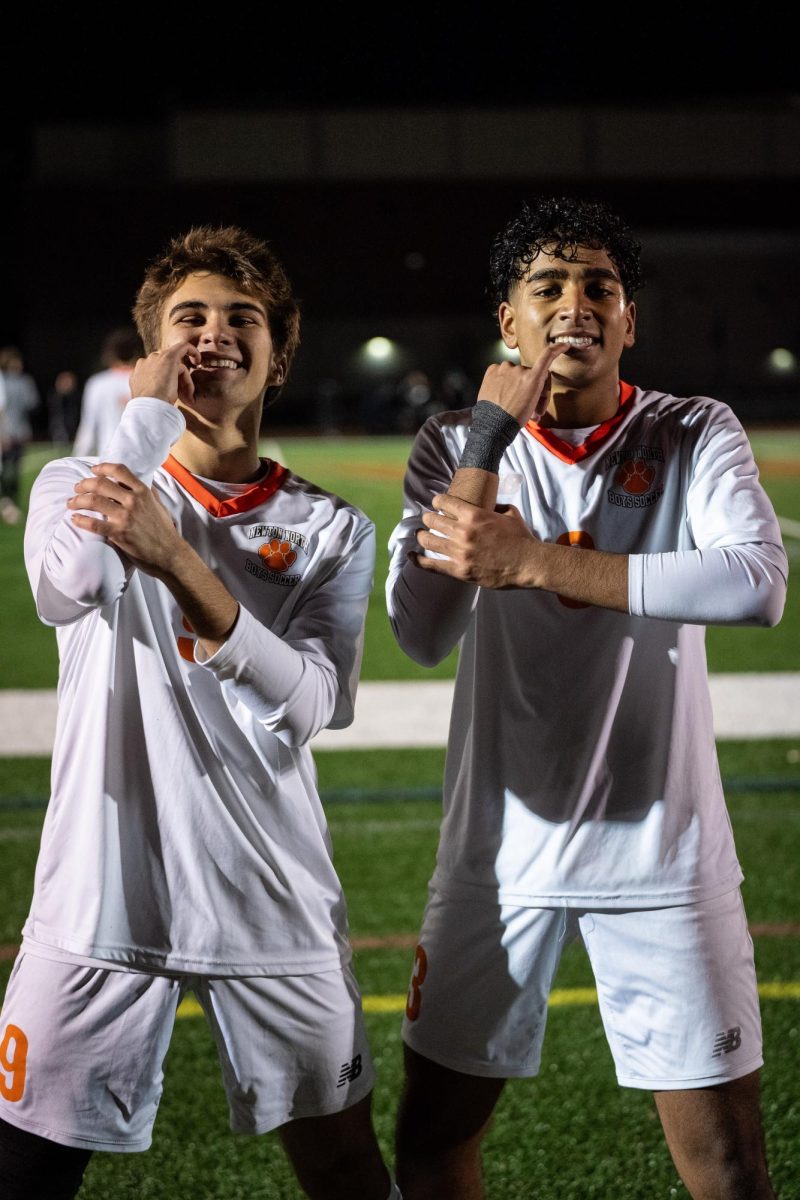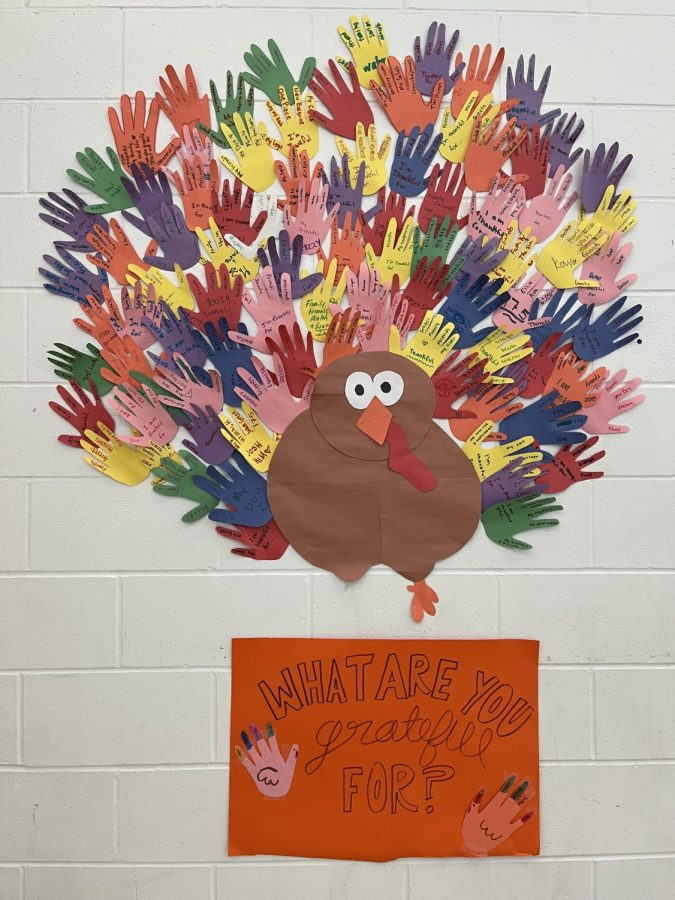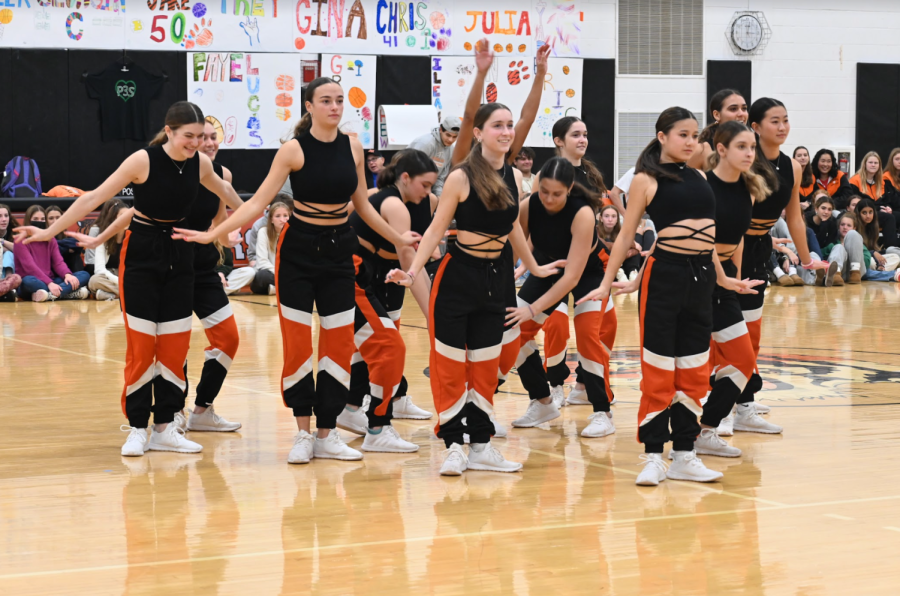
B-block
by Laura Schmidt-Hong
As part of Hispanic Heritage Day, Boston University professor and writer Tino Villanueva spoke about his childhood growing up in St. Marcos, Texas, read aloud two of his poems and discussed the history of Spanish settlements in the Americas Wednesday during B-block in the Little Theatre.
Spanish teacher Cristina Schulze began the presentation by explaining that the purpose of Hispanic Culture Day is to “bring the ideas and cultures of countries all over the world to Newton North.”
She then introduced Villanueva and his poems, which she said explore the ideas of “memory, longing, and mystery.”
Villanueva first described his childhood growing up in St. Marcos, a town in central Texas that relied on farming crops such as corn and cotton. “What saved me from further field work, from being a migrant worker, was that a furniture factory moved to our hometown,” said Villanueva.
Villanueva worked in the factory for four years, breaking what he described as “the migrant cycle,” then was drafted to work in the Panama Canal Zone during the Vietnam War.
The base where Villanueva was stationed included an office run by Southwest Texas State University, allowing him to enroll in history classes there. When he was discharged, he continued his education at Southwest Texas State University under the G.I. Bill and went on to receive a master’s from the State University of New York at Buffalo and a Ph. D. from Boston University.
After discussing his background, Villanueva read two of his poems, “Más La Voz Que El Tiempo” (Voice Over Time), a poem about the process of expressing thoughts through writing, and “Convocación De Palabras” (Convocation of Words), which describes Villanueva’s struggles and perseverance in learning complex English words.
He explained that part of his inspiration for the latter poem stemmed from his effort to expand his vocabulary in order to pass a civil service exam. He said, “The more I learned, the more my self-esteem went up. That took me by surprise.”
Villanueva also described the history of Spanish settlements and missions in North America, naming the Spanish priest Junípero Serra as a relevant historical figure of the time.
Villanueva concluded the presentation by noting the power of literature and poetry, saying, “I’m here because I’ve done something with words.”
E-block
by Will Kharfen
Eight senior panelists discussed their Hispanic background during Hispanic Heritage Day Wednesday during E-block in the Little Theatre.
The speakers, seniors Isaiah Aponte, Daisy Canta, Carolina Fernandez, Carlos Gonzalez, Alejandra Lagos, Andres Otero, Ali Ridley, Ashley Rodriguez, and Jovanni Santiago, answered questions relating to their cultural values and beliefs. The event was lead by Spanish teacher Jose Luis Sancho and moderated by Spanish teacher Cristina Schulze.
Their parents’ expectations played an important role in all the panelists’ lives. “I am very dedicated to my in school and out of school activities because my mother pushes me to do my best,” said Lagos.
When asked about the opportunities they receive in Newton, they all agreed that they were lucky, but in the end, it’s all about “taking advantage of those opportunities you are given,” said Rodriguez.
Gonzalez knows they all love their roots, but admits there aren’t enough opportunities, unlike Newton. “All our countries are beautiful, but [Newton] is where the opportunities are, so I love to visit home, but I need to stay here.”
Students in attendance said they felt inspired and motivated by what they heard. “It was very inspirational because it made me value the opportunities I have and it also showed me that if I want to succeed, I need to work hard and always put family first,” said sophomore Mitchell Tverskoy.
Sophomore Sam Norwitz felt similarly. He added that “the panelists seem very motivated because their experiences are ones that many people can’t relate to at North.”
Once the panel finished, science teacher Arielle Miles and North parent Carol Reichart performed a Flamenco dance. “The dancing was really nice and beautiful,” said Norwitz.
This marks the third year this event has been held. Schulze says the idea for the event came from the other celebrated cultures and lifestyles that have received specific celebration days throughout the year. Schulze says she is “very proud to hear Hispanic voices at school it doesn’t express their thoughts and feelings.” She added, “I’m glad the school and teachers are supporting diversity and promote understanding and inclusiveness.”
F-block
by Maya Waldman
Sabrina Avilez, executive director of the Boston Latino International Film Festival (BLIFF), presented two short films to demonstrate the hardships many Hispanics face in America Wednesday during F-block in the Film Lecture Hall.
The BLIFF was created almost 15 years ago, said Avilez, who identifies as Puerto Rican Dominican and speaks fluent Spanish. The festival takes place at Emerson College, Harvard University, and Northeastern University.“It’s a place where we can have important discussions about Hispanic heritage,” added Avilez. The festival dates for 2017 are Sep. 29 to Oct. 2.
After presenting two short films, one about a separated family of undocumented immigrants and one about the border dividing Mexico and the United States, Avilez allowed the audience to ask questions and described the festival itself. “I believe in its mission and the issues it brings to light,” said Avilez. “Of course we don’t want to hit everyone on the head with politics, but it’s going to affect you inevitably.”
As someone who speaks fluent Spanish, Avilez described the many benefits of knowing another language. “The more languages you speak, the more advantage you have in the working and learning environment,” said Avilez.
Avilez graduated film school at Boston University and began working at WGBH soon after. She travels through Latin America, Central America and Europe in order to make documentaries for organizations such as PBS.
Avilez believes that when a human face, rather than words, is put to an idea, it changes the way people feel about the issue. “The videos we make put a face to the issues they discuss, and it makes people care more,” she said.
To learn more about the festival, go to www.bliff.org.
G-block
by Lucy Lu
Luis E. Selva (Ph.D), who works at the Veteran Administration Healthcare System, discussed the impact of his Salvatorian heritage on his life and career during G-block in the Little Theatre as a part of Hispanic Heritage Day.
Born in San Salvador, El Salvador, Selva grew up in a family of four children, raised by his parents who had both left school after the third grade in order to provide for their family.
Despite his humble childhood, he had far-reaching ambitions. “Right from the get-go, at age four or five, I knew I wanted to be an astronaut,” said Selva, “even though most of my friends wanted to be metermaids or drive trash trucks.”
In 1975, Selva immigrated to the U.S. with the rest of his family and settled down in the Los Angeles area, where he obtained most of his education.
Throughout his childhood, Selva exercised his propensity for science and his appetite for knowledge, from building model rockets to experimenting with chemistry sets. This passion for science eventually earned him admission into the James A. Garfield High School for Science and Technology, where he was a student of renowned calculus teacher Jaime Escalante.
“In a relatively poor, 97 percent Latino community, he taught us that you have to set your expectations high,” Selva said, “and you have to achieve them.”
With the guidance of Escalante, Selva continued his studies at USC, CalState, and UCLA, going on to work at the Jet Propulsion Laboratory at NASA for 13 years.
In 2009, Selva transitioned back into medicine and now works at Veteran’s Hospital in Jamaica Plain building the Million Veteran Program (MVP), the largest database of genetic material, in hopes of finding a cure to cancer.
“Inevitably we will always fail, just as I did,” said Selva, “But I was able to reexamine and re-prioritize. When new opportunity comes, take full advantage of it.”
Hispanic Heritage Day features speakers, Spanish literature, films
November 18, 2016
0
Donate to The Newtonite
More to Discover












































